Introduction
Goat farming in Uttarakhand state is playing an important role in livelihood and nutritional security of millions of small/marginal farmers and landless labourers. Majority of the goat farmers rear their goats under extensive management system. Goat has great potential in the state as their numbers are about 6 times higher than that of sheep (0.285 million). Moreover, amid COVID-19 pandemic, large numbers of reverse migrations (migration from cities to the native villages) have been reported in the state. In such a situation, goat farming has provided livelihood support to large number of families. As per 2019 livestock census, the State had 1.85 million cattle, 0.87 million buffaloes, 1.37 million goats, 0.285 million sheep and 0.018 million pigs. Goat alone constitutes about 32% of total livestock population of the state. Out of total goat population (1.37million), more than half (52%) are present in four hilly districts Pithoragarh (16.48%), Almora (13.51%), Pauri (10.41%) and Dehradun (11.54%). The growth in goat population can be improved by technological interventions for reducing mortality among kids and adult animals and enhancing productivity. Amid COVID-19 crisis, with large population base and untapped potential of goats in the state, more benefits were obtained in a short period of time. Technological interventions on breeding, management system, healthcare, nutrition and marketing together increased the share of goat sector. Concerted efforts on transfer of technologies, capacity building on improved goat production and management practices with convenient access to resources, technologies and markets has empowered the goat farmers technically and provided sustainable livelihood security to the unemployed youths.
Coverage
| Regions | Name of District | Name of Block | Name of Villages | Status |
| Gharwal | Pauri Garhwal | Yamkeshwar | Jamal, Udda, Kolsi and Kandi | Intervention |
| Thangad and Kanda | Control | |||
| Dehradun | Vikasnagar | Kol, Chiliyo, Koti, Dharda | Intervention | |
| Mehuwala,Bavandhar | Control | |||
| Kumaon | Almora | Hawalbagh | Ghaneli,Gudkande, Odiyari and Katarmal | Intervention |
| Raun, Naula | Control | |||
| Pithoragarh | Gangolighat | Surkhal, Sunuda, Rankot, Baligaon | Intervention | |
| Uprada, Haat | Control |
Coverage: Regions (2), Districts (4), Blocks (4), Villages (24)
240 Goat Rearing Families
About 5-6,000 goats
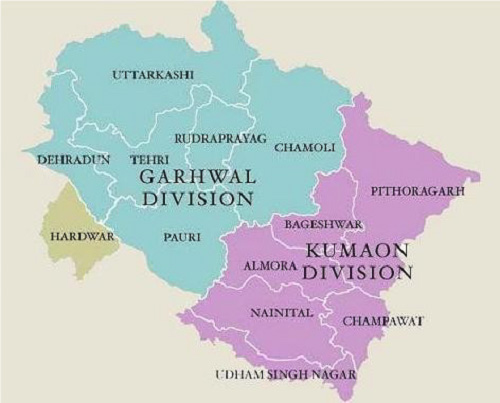
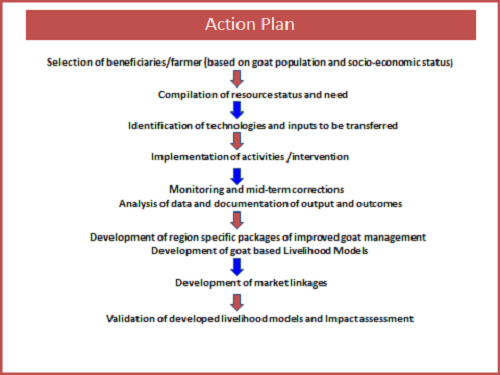
As we are aware that the entire country is passing through this critical time of the COVID- 19 pandemic, our project team has worked for large number of landless, marginal and small goat farmers who are rearing small ruminants for their livelihood security in Uttarakhand State. The activities earmarked in the DST funded project entitled: “Goat based technological and livelihood improvement in Uttarakhand state” were largely based on socio-economic upgrading and mitigate livelihood challenges through scientific goat farming.
Immediate (for the Lockdown) strategies/activities
- WhatsApp groups of goat farmers in Garhwal and Kumaon regions were formed as an immediate measure. Veterinary aid was provided to the goat rearers through these groups.
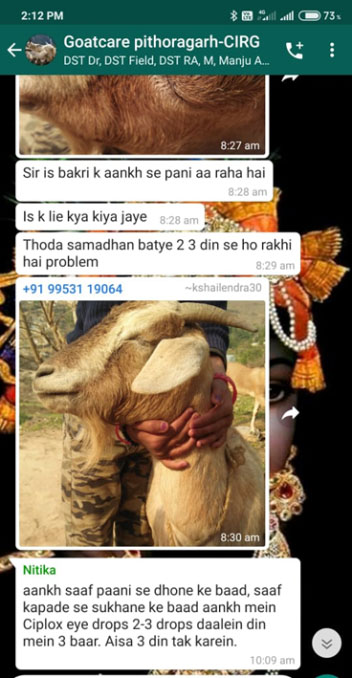
- Advisories for goat farmers on COVID-19 Pandemic were circulated to the farmers as an immediate measure.
- Goat management activities calendar for each months of March and April 2020 and thereafter for every month was circulated among the goat rearers.
- Arogya Setu App to fight against COVID-19 was circulated among the goat rearers and they were asked to install it immediately.
- Ayurvedic Upay to improve immunity against COVID-19 suggested by Ministry of AYUSH, Govt. of India were circulated among the goat rearers.
Advisory for Goat Farmers
Advisory was issued to the goat farmers during COVID-19 Crisis:
- It is a viral disease that spreads from infected persons through aerosol route, fecal –oral route, surface transmission, fomites etc
- Soap, bucket of water and hand sanitizer to be kept at the entrance gate of the Goat sheds, so that the persons taking care of the livestock can wash their hands before to entering and leaving the livestock farms.
- Goat rearers should use masks and ensure washing of hands with soap at regular intervals before handling any animal.
- Maintenance of proper hygiene in Goat shed is essential and it should be cleaned (if required sanitized) at regular intervals.
- Goat farmers are suggested for regular supplementation of mineral mixture @ 3-5 g/day/adult to maintain productivity.
- Goat rearers must maintain social distancing while attending the animals, collecting feeds and fodder, during rest, taking meals, loading/unloading of materials in the sheds.
- Goat rearers should arrange sufficient feed and fodders for the goats to ensure continuous feeding of the livestock.
- Goat farmers must sanitise the outer surface of packets of feed, mineral mixtures, salt licks, medicines etc prior to their use.
- Goat rearers should attend the pregnant goats and new-born kids during the COVID-19 crisis with utmost care to check kid mortality.
- Goat rearers should keep their herds separated from other herds in community grazing areas/ free range.
- If possible, fencing should be carried out to maintain social distancing.
- Sick workers with symptoms of fever, coughing and difficulty in breathing should be provided medical aid immediately.
- For further information goat rearers were advised to download and install Arogya setu app:
https://play.google.com/store/apps/details?id=nic.goi.aarogyasetu
Intermediate (after lockdown) strategies
After announcement of Unlock-II, our team has disseminated solutions/interventions for addressing challenges related to resilience of community in terms of health, socio-economic distress and livelihood. In this regard, the project beneficiaries were provided COVID-19 prevention kit and awareness camps were organized in the villages maintaining social distancing and wearing masks. This kit contain- Surgical mask, cloth mask, hand washing soap, hand gloves, sanitizer, KMnO4, lime powder (for sprinkling in goat sheds) and literature based on ministry of Home and Ministry of Ayush. Our team has also installed sign boards containing information on Do and Don’ts to prevent from COVID-19 in the adopted villages. Farmers were also appraised for care of their goats during monsoon season.
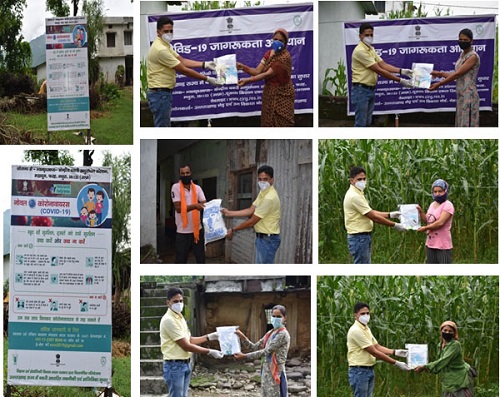
Women Empowerment Programme during COVID crisis
Under this DST project Gosthis were organised on “Bakri Palan Dwara Mahila Shashaktikaran” in Koti and Chiliyo villages of Vikasnagar block of Dehradun district. Large numbers of women goat farmers were participated in these gosthis. Lecture on role of women in goat farming was delivered and the participation of women in decision making at household, animal husbandry and other activities level were highlighted. The role of goat based women SHGs was also elaborated by the women staff of local NGO. Goat health camp, COVID-19 awareness camp, goat based SHG formation camp, Swach Bharat Abhiyan and other programmes were also organised. Goat medicine kits, mineral mixture, mineral blocks, and literature on improved goat farming practices were distributed to the participants. During all these activities precautionary measures for COVID-19 and social distancing were maintained.
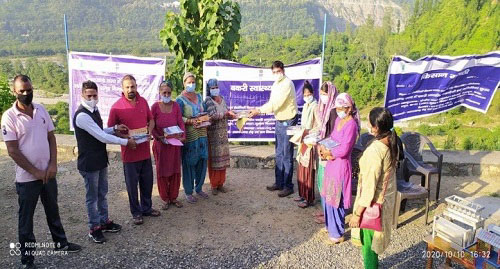
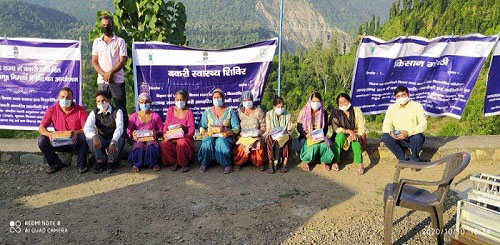
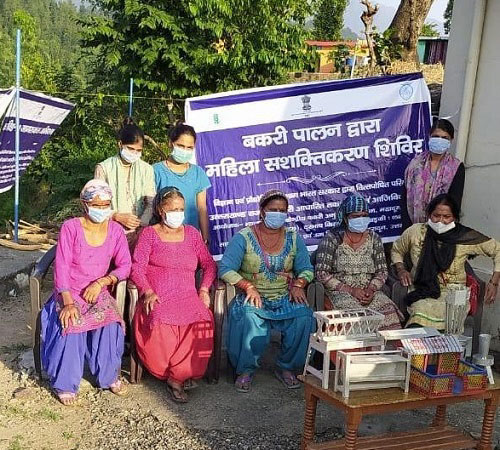





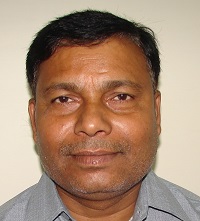
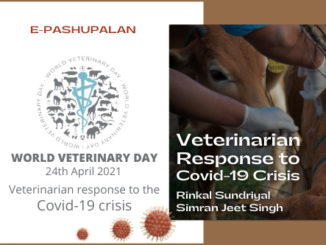

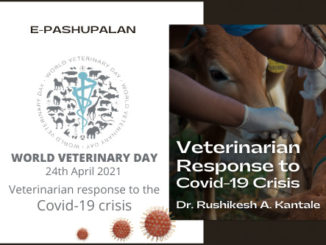

Be the first to comment